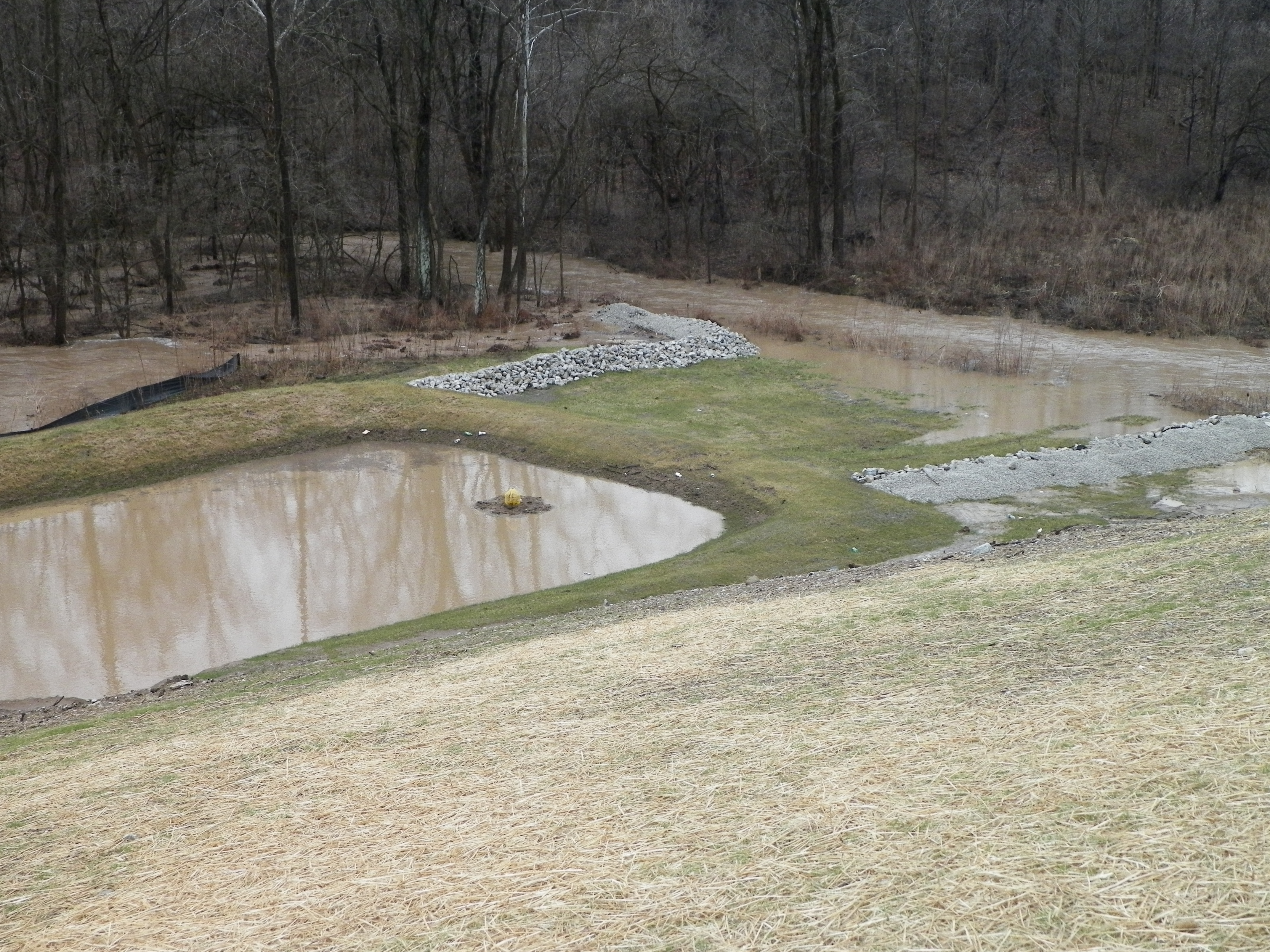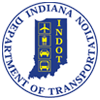
INDOT and Stormwater Quality
INDOT maintains almost 29,800 lane miles of highways, Operation and Maintenance Facilities, Welcome Centers and Rest Areas, and approximately 1,500 construction projects per year. This amount of impervious surface and construction poses a unique challenge to stormwater. Stormwater runoff is a major contributor to water pollution nationwide and one of the great challenges of pollution control.
Day-to-day activities on roadways can add up and cause stormwater pollution:
- Litter tossed out of vehicles or from uncovered truck loads
- Leaking oil or other fluids from cars
- Heavy metals from tires, brakes, and engine wear
- Sediment from road wear and tear
- Salt and other winter weather treatments
- Spills from traffic accidents
- Construction activities
- General facility use and maintenance
The following will discuss regulations and actions taken by INDOT to reduce its impact on stormwater pollution.
Construction Stormwater General Permit (CSGP)
The CSGP is a performance-based regulation designed to reduce pollutants that are associated with construction and/or land disturbing activities. The requirements of the Construction CSGP applies to all persons who are involved in construction activity (which includes clearing, grading, excavation and other land-disturbing activities) that results in the disturbance of one (1) acre or more of total land area. If the land-disturbing activity results in the disturbance of less than one (1) acre of total land area but is part of a larger common plan of development or sale, the project must obtain permit coverage under the CSGP.
For questions about INDOT’s CSGP coverage contact the Stormwater Specialists at CSGP@indot.in.gov. Information on active projects can also be found at IDEM’s nSITE Explorer.
Post-Construction Stormwater Measures (PCSMs)
INDOT's Municipal Separate Storm Sewer System (MS4) General Permit and the transition from Rule 5 (327 IAC 15-5) to the CSGP in 2021 requires INDOT to address discharges of post-construction stormwater run-off from new development and redevelopment. As areas develop and impervious surfaces increase, the stormwater velocity, quality, and types of pollutants exposed to stormwater can change and increase. INDOT must require PCSMs, where applicable, to reduce pollutants and downstream impact from roadways and new facilities. The following are guidance documents and resources that show how INDOT is addressing PCSMs and stormwater quality.
Design Memorandum 22-22 Post-Construction Stormwater Management
Post-Construction Stormwater Management Guidance 7-3-2024
PCSM Quick Facts
Resources
- CADD Post Construction
- PCSM Submittal Requirement 9-25-2024
- Hydraulic Residence Time Calculation Template
- Water Quality Volume Calculation Template
Maintenance Plan Templates
- Dry Detention Pond
- Dry Native Grass Swale
- Dry Turf Grass Swale
- Infiltration Basin
- Infiltration Swale
- Native Grass Filter Strip
- Proprietary Device
- Turf Grass Filter
- Wet Retention Pond
- Wet Swale
INDOT Construction Stormwater Training
The Construction Stormwater Training introduces participants to Erosion and Sediment Control regulations and practices through several online modules. The modules and exam require an estimated 8-10 hours for completion. This training is designed for Stormwater Quality Managers and others inspecting INDOT projects but can be taken by anyone interested in learning more about INDOT Stormwater Management.
For more information about the course, registration, renewals, and active status please visit the training course information page here.
Municipal Separate Storm Sewer System (MS4) General Permit
INDOT has been recognized as an MS4 and is required to create goals to reduce its impact on stormwater pollution. The requirements of the MS4 General Permit influence nearly every aspect of INDOT’s operations, from construction projects and their design, operation and maintenance of facilities, employee education, and beyond.
INDOT is required to submit a Stormwater Quality Management Plan (SWQMP) and an Annual Report to IDEM. These are required to show INDOT is working toward the goals in the MS4 General Permit to help protect Indiana’s stormwater run-off from INDOT’s roadways and construction projects.
For further information please contact the MS4 Coordinator at stormwater@indot.in.gov or 855-INDOT4U (463-6848).
For more information on the MS4 General Permit go to IDEM’s website here.
INDOT MS4 Public Notice
Per the requirements in the MS4 permit INDOT will submit a Notice of Intent to notify IDEM of its intent to comply with the requirements of the MS4 General Permit to Discharge stormwater run-off from interstate highways, US Routes and State Roads into watersheds located within the State of Indiana.
SWQMP Annual Reports
- SWQMP Annual Report 2022-2023
- SWQMP Annual Report 2021-2022 (Skipped per IDEM)
- SWQMP Annual Report 2020-2021
- SWQMP Annual Report 2019-2020
- SWQMP Annual Report 2018-2019
- SWQMP Annual Report 2017-2018
- SWQMP Annual Report 2016-2017
- SWQMP Annual Report 2015-2016
- SWQMP Annual Report 2014-2015
INDOT MS4 Partnership Mapping Tool
The MS4 Partnership Mapping Tool is Indiana’s interactive electronic map tool that can be used to explore and view MS4 boundaries adjacent to INDOT Roadways for urban areas, surface waters, day light conveyances, impaired waters, and other data. The MS4 Partnership Mapping Tool is evolving as more data is gathered through the cooperation and partnerships of Indiana’s MS4s
Supplemental Resources
- OPM 17-03 Maintenance Responsibilities for Draining on State Highway System in Cities and Towns
- INDOT MS4 General 2019 Permit
- INDOT Illicit Discharge Detection and Elimination (IDDE) Plan
See Something, Smell Something, Say Something

Report Pollution at INDOT4U
Help INDOT and the INDOT Stormwater team find pollution in our right-of-way so that dangerous and toxic discharges can be cleaned up. By reporting a concern, INDOT can improve the safety for our traveling public and environmental health across the state of Indiana.
INDOT Links
- Report a Concern or Find Information
- Indiana Design Manual
- Standard Specifications
- INDOT Standard Drawings
- INDOT Stormwater Field Guide
- Stormwater, Erosion and Sediment Control Inspection Report
- Per specification this inspection form shall only be used in the event that the electronic inspection form is out of service or as directed.
- Ecology & Waterway Permitting
- Green Initiatives
